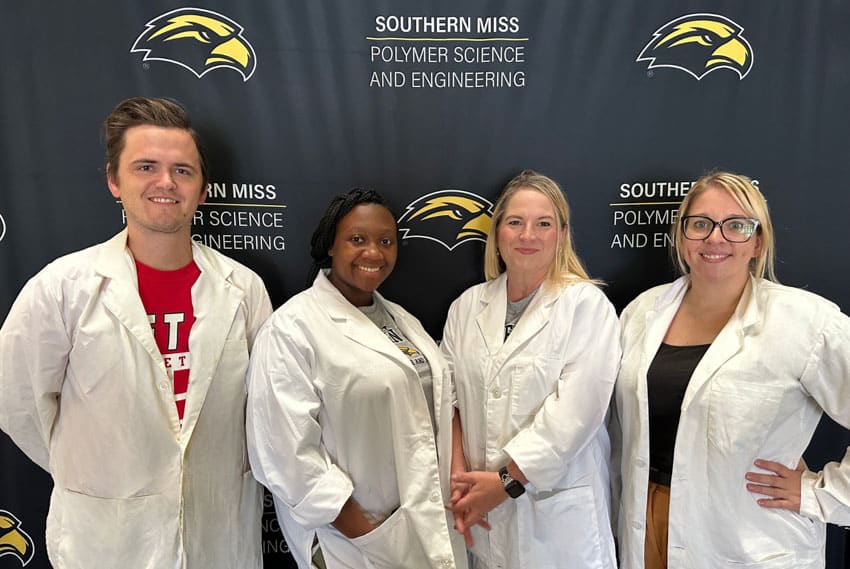The University of Southern Mississippi’s (USM) School of Polymer Science and Engineering (SPSE) hosted the National Science Foundation-funded Research Experience for Teachers Site (RET), providing local high school teachers the opportunity to participate in sustainable materials research for six weeks in laboratories on the Hattiesburg campus.
Teachers worked with SPSE faculty and student researchers in efforts focused on addressing challenges in sustainable polymer engineering, including reducing waste through design of degradable and bio-based polymers, improving water quality through polymer sensors and delivery vehicles, and enabling alternative energy approaches with high performance polymers.
By the end of the program, teachers developed lesson plans and laboratory activities with content based on their summer research. The lessons are designed to engage students in classroom experiments with relevance to the world around them, increasing interest in polymer science and STEM fields.
Claire Clemons, Director of Education and Outreach in SPSE, is the Program Manager for the RET site. “We are able to create a professional network of science teachers that extends beyond the duration of the program,” said Clemons. “As the program manager, one of the highlights for me is visiting the classes and witnessing the teachers implementing their lessons. In addition to the high-level learning that occurs, for some, the excitement is in discovering the opportunities our program at Southern Miss has to offer.”
Dr. Sarah Morgan, Professor and Associate Director, and Dr. Heather Broadhead Associate Teaching Professor in SPSE, are Principal Investigator and Co-Principal Investigator of the program. Designed to create long-term professional relationships between Southern Miss faculty and Mississippi High School and Community College teachers, this program involves educators in impactful research projects. These projects directly impact the key economic drivers of the State of Mississippi and contribute to solving the shortage of U.S. students pursuing STEM careers – a trend that has been reported by the U.S. Bureau of Labor Statistics.
STEM fields are vital for the nation’s economic strength and security, yet there is a critical shortage of engineering talent. Research in sustainable materials, undertaken through this program, is directly relevant to teachers, students, and their families, positively impacting the state’s economic landscape.
Integrated with the research experience, teachers also participated in education and professional development programs, including team-building workshops, short courses in polymer science, field trips to industry and presentation skills development.
Participant Lisa Klann, a second-year RET from D’Iberville High School, praised the program for setting teachers up for success, ensuring they return to their classrooms ready to teach and inspire future generations to explore possibilities in STEM.
“Participating in the program has given me a deeper understanding of cutting-edge research and provided hands-on experience with advanced machinery and equipment that science teachers typically only read about,” said Klann. “It is designed to set teachers up for success by equipping us with the tools needed to enhance our students’ learning. With a better grasp of the advancements in polymer science, I’ll be able to extend this knowledge to my students, inspiring them to explore new possibilities for their future.”
From field trips to Southern Miss and visits of faculty and graduate students to teacher classrooms, to attending presentations and workshops at the Mississippi Science Teachers Association and other national conferences, the program involves year-round interactions to maintain engagement with teachers.
Dr. Broadhead stated: “Being a faculty mentor in the RET program enables me to contribute actively to both teacher professional development and student education, fostering a pipeline of talented individuals interested in pursuing careers in STEM fields, particularly in polymer science and engineering.
“We found great satisfaction in witnessing the growth of this year’s cohort, as well as their impact on their own students,” Dr. Broadhead further noted.
This year’s cohort and projects included:
Needra Davis-Hubbard
Chemistry Teacher at Quitman High School
Project Title: Utilizing Protic Ionic Liquids to Induce Glycolysis of Polyethylene Terephthalate
Faculty Mentor: Dr. Zhe Qiang (Qiang Research Lab)
Courtney Germany
Mount Olive Attendance Centre – Biology Teacher
Project Title: Development and Characterization of Novel Bioactive Peptide Amphiphiles for Tissue Engineering Scaffolds in the Treatment of Deep Dermal Burns
Faculty Mentor: Dr. Tristan Clemons (Clemons Research Lab)
Lisa Klann
Chemistry and Physics Teacher at D’Iberville High School
Title: Statistical Design of Experiments to Investigate Processing Conditions and Polymer Solution Wettability
Faculty Mentor: Dr. Boran Ma (Ma Research Lab)
Kyle Sullivan
Biology Teacher at Petal High School
Project Title: Controlling Bacterial Biofilm Formation in Flow Cells
Faculty Mentor: Dr. Heather Broadhead (Broadhead Research Group)




